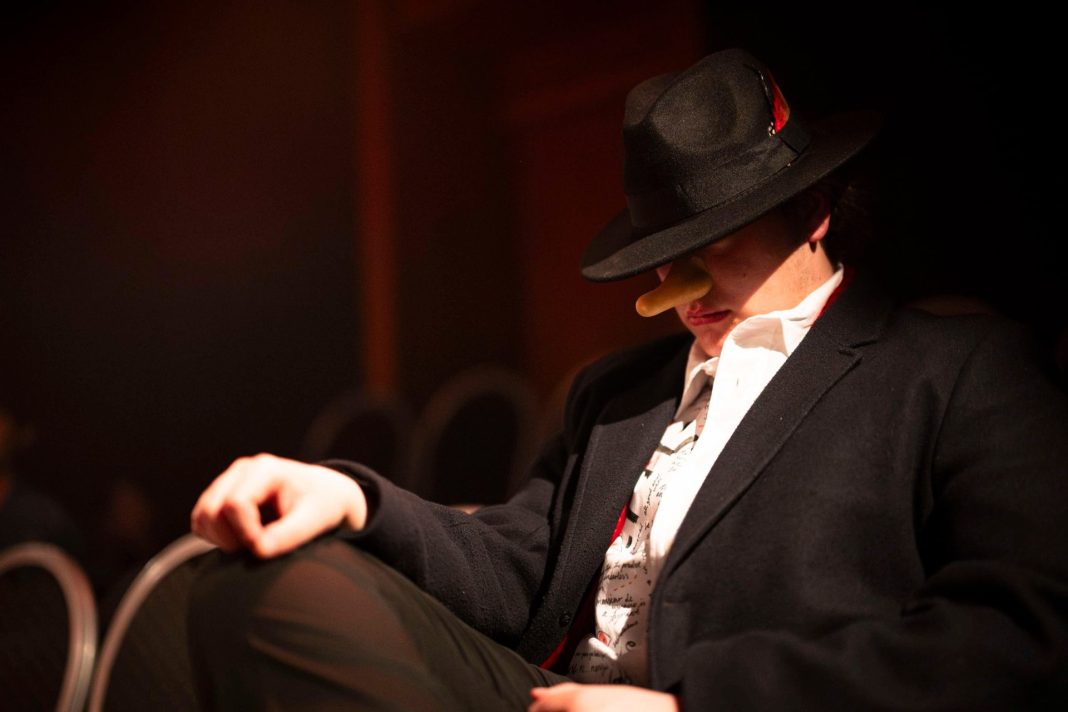I’m ashamed to admit I almost mistake Cuigy (Kate Burke) and Brissaille (Nancy Gittus) for incredibly dapper audience members before the play begins. The sweet jazz that pipes out among the smoke as the audience files in ends up being indicative of the play’s quality: Cyrano is whimsical and delightful, anchored by a showstopping turn from Cameron Maiklem as the titular character. This well-loved play has been adapted many times over the years, but this new show nonetheless stands out.
Saddled with a frankly jaw-dropping amount of monologues to deliver, Maiklem gleefully chews up each and every word with a manic gleam in his eye and an impressive amount of vocal fry. His verbose dismantling of Brissaille is a highlight of the first act as they duel while Cyrano composes a “ballad of a battle between Monsieur de Bergerac and a coxcomb.” On the fly, Brissaille hesitantly asks: “What is that?”
In response, Cyrano says, with the arrogant, enthralling grin of a man who’s better than you and knows it: “The title.” Maiklem is having fun. So, you find, are you. Equally as entertaining is Raguneau (Tristan Hood), a bumbling, generous old pastry chef, at once unfazed and endeared by Cyrano’s dramatics, who delivers a monologue about almond tarts with great gusto, and Ligniere (Ioannis Angelos Karanasios), an ostentatious drunkard.
Still, any actor who plays Cyrano has to sell to us his vulnerability and insecurity in order for us to buy the entire premise of the play, and Maiklem more than succeeds. It’s impressive how drastically he switches up the timbre of his voice and his stance from Cyrano-in-public to Cyrano-in-private. Gone is the cocksure wordsmith who revels in taking every opportunity to show someone up: in his place is a quiet, self-deprecating man who believes his homeliness bars him from ever finding love, much less that of his cousin Roxane.
At this point I must give the costuming, which is incredibly clever, a shout out: the crew have dressed the cast in variations of black and white with only accents of red: socks, a rose, a scarf. So when Roxane (Robyn Hayward) makes her first appearance, almost glowing in her red dress, we feel just like Cyrano must: it’s impossible to look away from her. Hayward, too, is excellent as Roxane: her loveliness is often spirited but never cloying, helped by her lilting accent. Christian (Mark van Eykenhof), the last member of this central trio (him, Cyrano, Roxane), completes a trinity of talent with a self-professed “easy military wit” and the familiar, tongue-tied charisma of a lovelorn soldier.
It’s an old tale: the inarticulate, handsome Christian wants a way to express his reciprocated love for Roxane, and who better to hire than Cyrano? When he flounders in the face of Roxane’s request for eloquence and can summon no more than the simple and eminently obvious I love you, it’s Cyrano who speaks from the shadows, puts poetry in Christian’s mouth that Roxane can’t see from up on her balcony. You feel bad – but for which member of this melancholic trio?
The play does drag in certain parts: a bit right before the intermission, for instance, where Cyrano impersonates a madman in order to delay De Guiche (Stan Toyne) from interrupting the secret wedding of Christian and Roxane. Maiklem prances around the stage with an affected drawl and a breathy giggle, helped not insubstantially by the smart lighting and sound design of Cayden Ong and Pep Oosterhuis. The whirlwind of almost psychedelic colour and chimes makes full use of the intimacy the Pilch offers and ensures the scene still remains somewhat entertaining; it would have flagged in the hands of lesser cast and crew.
In such a production, there are still a few things worth singling out. Toyne, for one, whose De Guiche is beleaguered, bitter, and captures all the pitiful misery of finishing third in a two-horse race – yet so helplessly enamoured by Roxane that he somehow acquires a kicked-puppy charm. The sturdiness of Cyrano’s prosthetic nose, for another: it doesn’t budge an inch even though I can see beads of sweat sliding down Maiklem’s face. And though the scenes of battle at Aras are slightly underwhelming despite the actors gamely giving it their all, it’s easy enough to forgive.
It’s another clever bit of costuming that ties the play’s ending together: the red scarf Cyrano’s been winding around his neck the whole play becomes the blood-soaked bandage wrapped around his fatal head wound. As the lights come up on Cyrano’s surprisingly affecting death I see the director (Lara Machado) smiling from her seat in the front row; she should be. Cyrano de Bergerac takes a script full of sly innuendos and rises to meet it with no small amount of heart and energy. It’s an old play about love rendered new by precisely that – the love you can feel the cast and crew have put into this timeless production.


